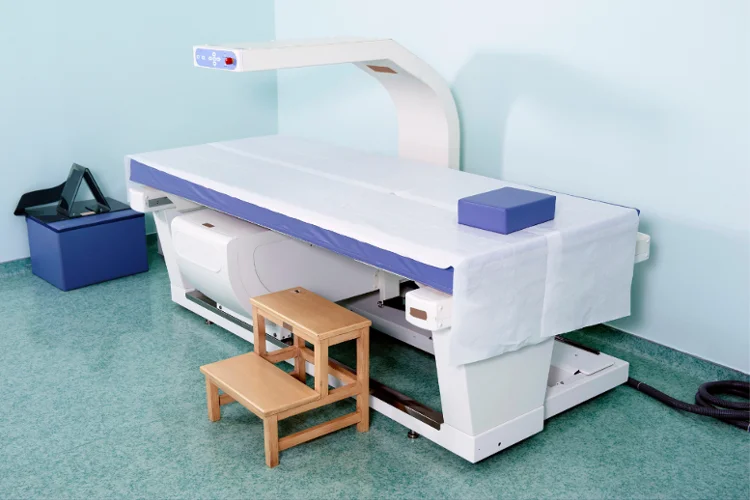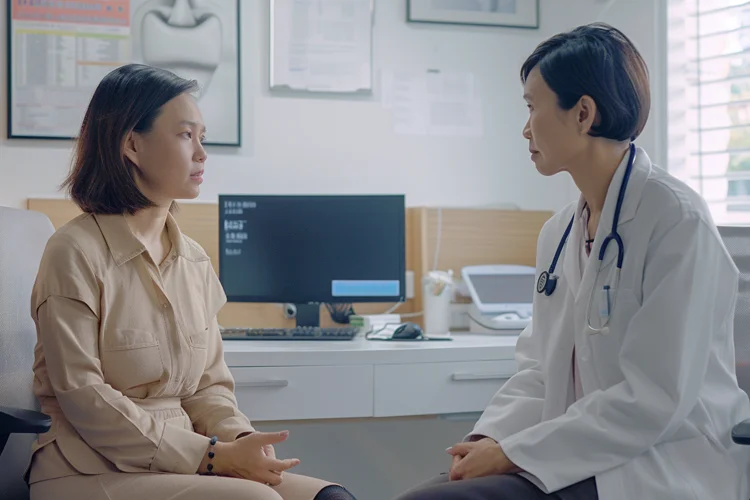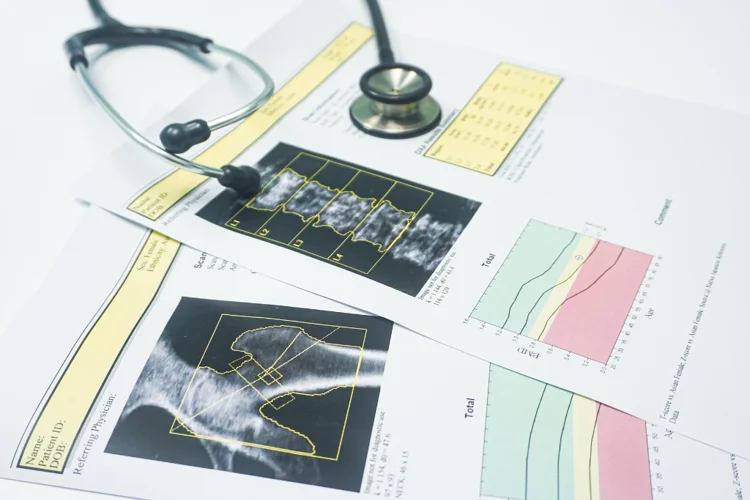Bone Density Test Singapore
Last updated: Jan 15, 2026
What Is a Bone Density Test?
A bone mineral density (BMD) test, also known as bone mineral densitometry, is a fast and non-invasive procedure used to measure the mineral content and strength of your bones. This test helps to:
- Assess your risk of osteoporosis and fractures, enabling early prevention and treatment.
- Monitor bone health over time and evaluate the effectiveness of treatments or lifestyle changes, particularly if you have osteopenia or osteoporosis.

What Is Bone Mineral Density?
Bone mineral density refers to the concentration of minerals, such as calcium and phosphorus, within a specific area of bone. It is an indicator of bone strength and structural integrity, revealing how resilient a bone is to fractures. Higher bone mass density suggests that bones are stronger and less likely to break, while lower density can indicate weaker bones.
Who Should Consider a Bone Density Test?
In Singapore, bone mineral density testing is generally recommended for individuals with risk factors which can include:
- Aged over 50: Bone density naturally declines with age, increasing the risk of osteoporosis.
- Women who have undergone menopause or an oophorectomy (surgical removal of ovaries): Reduced oestrogen levels after menopause or oophorectomy can accelerate bone loss.
- Family history of osteoporosis: Genetics play a significant role in bone health, making those with a family history more susceptible.
- Previous bone fractures: Past fractures can indicate weakened bones and a higher risk of future fractures.
- Lower body weight or lighter bones: Individuals with lower body weight or a small frame may have less bone mass, heightening osteoporosis risk.
- Previous height loss: Height loss may signal vertebral fractures or bone deterioration, which can indicate osteoporosis.
- Deficiency in bone-building nutrients: Nutrients such as calcium, magnesium, vitamin D, and vitamin K are essential for maintaining strong bones, and deficiencies can lead to bone loss.
- Sedentary lifestyle or low physical activity: Regular exercise, particularly weight-bearing activities, is important for preventing bone loss.

How Is a Bone Density Test Done?
A bone mineral density test involves lying on a padded table while a scanner passes over your body, providing precise and accurate measurements of bone density, particularly in areas most susceptible to fractures, such as the spine, hip, and sometimes the forearm. It is a straightforward procedure that typically takes 10-30 minutes. The scan utilises Dual-Energy X-ray Absorptiometry (DEXA), which emits minimal amounts of ionising radiation, making it a commonly used option for routine testing and monitoring of bone health.
Interpreting Bone Density Test Results
Your test results will typically be present in the form of a T-score and Z-score:
T-Score
The T-score compares your bone density to that of a healthy 30-year-old adult, which is represented by a score of 0. Scores above -1 are considered normal. Scores between -1 and -2.5 suggest low bone mass, known as osteopenia. Scores below -2.5 may indicate osteoporosis.
Z-Score
The Z-score compares your bone density to that of others of the same age, gender, and body size, making it particularly useful for assessing bone health in younger individuals.

Bone Density Test Preparation
To prepare for a bone mineral density test, you should:
- Avoid calcium supplements 24 hours before the test, as excess calcium in the blood may increase bone density readings temporarily.
- Wear loose clothing without metal zippers, belts, or buttons as metal can interfere with scan readings, potentially affecting the accuracy and results of the test.
- Inform your doctor of any recent imaging tests, such as a barium exam or CT scan with contrast dye, as these can lead to less accurate bone density measurements.
Bone Density Test Cost in Singapore
At ATA Medical, we offer a range of DEXA scans and bone health-related tests, with the following prices:
| Test | Price* |
|---|---|
| Consultation | From $49.05 |
| Teleconsultation (for reviewing of results) | From $38.15 |
| Bone Mineral Densitometry | |
| Bone Mineral Density Test - DEXA Bone Densitometry (Hip & Spine) | $141.70 |
| DEXA Body Composition | |
| DEXA Body Composition with Visceral Adipose Tissue (VAT) | $308.47 |
| Others | |
| Ultrasound Heel (Bone Mass Density) | $43.60 |
| Vitamin D Deficiency Screen | $130.80 |
| Deficiency Screen (Folate, Vitamin B12, Vitamin D, Iron, Total Iron Binding Capacity, % Iron Saturation, Ferritin) | $161.32 |
| Total Testosterone | $49.05 |
| Free Testosterone | $147.15 |
|
Men & Women Wellness (Full Body Screening)
Note: Fasting of 8 hours is required for your blood test |
From $152 |
^Prices last updated on Jan 28, 2026. While every effort is made to keep pricing information up to date, please contact our team to confirm the latest rates.
For a more comprehensive review of your health, you can consider our health screening packages which can include Bone Densitometry and/or Ultrasound Heel (Bone Mass Density) tests.
Where to Do a Bone Density Test in Singapore?
Please note that our DEXA Bone Densitometry (Hip & Spine) and DEXA Body Composition with Visceral Adipose Tissue (VAT) scans are performed at our partner radiology clinic in Orchard (Shaw House).


